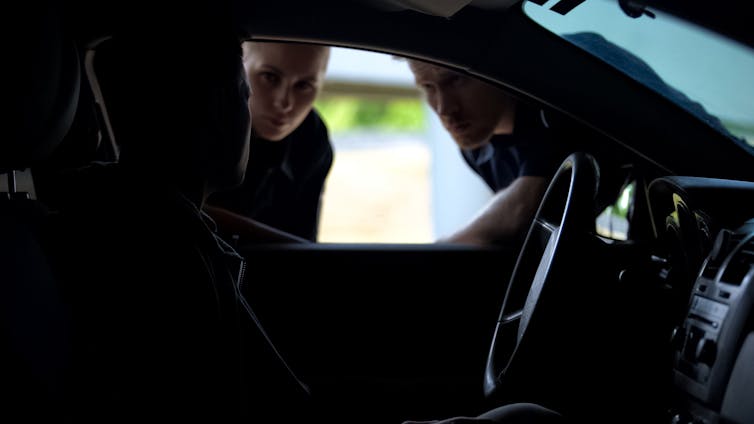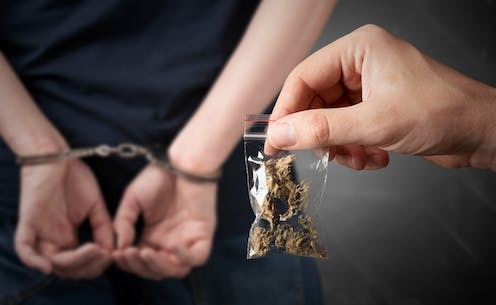In an attempt to clamp down on recreational drug use, the British government recently set out a three-tier system for dealing with people caught in possession of illegal substances.
A scale of punishments would be introduced for those caught in possession once, twice or three times. These would begin with a fine and culminate in a variety of deeply punitive options such as tagging offenders, suspending their driving licence and even confiscating their passport.
All this is being promoted as part of a government plan, entitled Swift, Certain, Tough: new consequences for drug possession, which aims to bring overall drug use down to “a historic 30-year low” by “delivering a generational shift in demand”.
Other nations, including the US, Jamaica and Thailand are modernising their drug policies and moving away from criminalisation. The UK, meanwhile, seems determined to disregard the evidence that has for decades contradicted the idea that ever-tougher responses are needed.
Research has long shown that punitive measures are not a deterrent. Further, most illegal drug use is recreational, more commonly associated with leisure and pleasure than criminality. Research shows that recreational drug use rarely leads to addiction or requires treatment.
The government seems far from understanding this, as is evident when it calls drugs the “root of untold harm and misery across our society” in its reform proposals. It is questionable whether this reductionist discourse applies to any drug user – there are, for example, functioning heroin addicts who live normal productive lives – let alone recreational drugs and their users.
Evidence shows criminalising otherwise law-abiding citizens for their drug use does not deter them from doing it. In fact, it merely serves to damage their life chances
We know that a conviction makes it harder for people (and particularly young people) to find housing, get a job and travel. It also makes them more likely to continue offending. All this should make the government think long and hard about which offences therefore justify serious punishment.
Punitive measures are discriminatory in practice
Drug laws and their punishments are not applied equitably and tend to discriminate along the lines of class, and gender, as we have already seen with cannabis warnings. Cannabis warnings are issued by the police for those found in possession of a small amount of cannabis and operate as the first stage of a similar three-tiered escalation system implemented to deal with cannabis use.
And when it comes to race, they discriminate too. In London, black people, often from deprived areas, receive cannabis warnings at three times the rate of white people.
Law enforcement measures are being used to deter recreational drug use, while more harmful substances such as alcohol, tobacco and sugar remain legal and socially acceptable. This, despite the research being clear on how such substances cause more harm than many of their illicit counterparts. A truly evidence-based approach to drugs would look very different.
The proposed new “three-tier” approach may appear to be a reform but the reality is that while the government’s proposed punishments for first and second offences may appear to err towards decriminalisation, the punishments for third offences – tagging offenders, suspending their driving licences and confiscating their passports – are extreme.

Heavy policing doesn’t end drug use, as decades of the same approach have proved. Shutterstock
Ultimately, this remains a law enforcement approach that has already been shown to be ineffective. It will not bring overall drug use down. It will, however, undoubtedly cause untold harm to thousands of people.
Instead of focusing on low-level possession of recreational drugs, we need realistic, effective, evidence-based ways to reduce the harms of drugs, in terms of use and supply. We also need to support those drug users who want support, rather than inflicting punishments that will disproportionately criminalise certain groups of users.



 US Judge Rejects $2.36B Penalty Bid Against Google in Privacy Data Case
US Judge Rejects $2.36B Penalty Bid Against Google in Privacy Data Case  CK Hutchison Launches Arbitration After Panama Court Revokes Canal Port Licences
CK Hutchison Launches Arbitration After Panama Court Revokes Canal Port Licences  Federal Reserve Faces Subpoena Delay Amid Investigation Into Chair Jerome Powell
Federal Reserve Faces Subpoena Delay Amid Investigation Into Chair Jerome Powell  Citigroup Faces Lawsuit Over Alleged Sexual Harassment by Top Wealth Executive
Citigroup Faces Lawsuit Over Alleged Sexual Harassment by Top Wealth Executive  Minnesota Judge Rejects Bid to Halt Trump Immigration Enforcement in Minneapolis
Minnesota Judge Rejects Bid to Halt Trump Immigration Enforcement in Minneapolis  Federal Judge Blocks Trump Administration Move to End TPS for Haitian Immigrants
Federal Judge Blocks Trump Administration Move to End TPS for Haitian Immigrants  Uber Ordered to Pay $8.5 Million in Bellwether Sexual Assault Lawsuit
Uber Ordered to Pay $8.5 Million in Bellwether Sexual Assault Lawsuit  CK Hutchison Unit Launches Arbitration Against Panama Over Port Concessions Ruling
CK Hutchison Unit Launches Arbitration Against Panama Over Port Concessions Ruling  Federal Judge Restores Funding for Gateway Rail Tunnel Project
Federal Judge Restores Funding for Gateway Rail Tunnel Project  Supreme Court Tests Federal Reserve Independence Amid Trump’s Bid to Fire Lisa Cook
Supreme Court Tests Federal Reserve Independence Amid Trump’s Bid to Fire Lisa Cook  Court Allows Expert Testimony Linking Johnson & Johnson Talc Products to Ovarian Cancer
Court Allows Expert Testimony Linking Johnson & Johnson Talc Products to Ovarian Cancer  U.S. Condemns South Africa’s Expulsion of Israeli Diplomat Amid Rising Diplomatic Tensions
U.S. Condemns South Africa’s Expulsion of Israeli Diplomat Amid Rising Diplomatic Tensions  Google Halts UK YouTube TV Measurement Service After Legal Action
Google Halts UK YouTube TV Measurement Service After Legal Action  Meta Faces Lawsuit Over Alleged Approval of AI Chatbots Allowing Sexual Interactions With Minors
Meta Faces Lawsuit Over Alleged Approval of AI Chatbots Allowing Sexual Interactions With Minors  Newly Released DOJ Epstein Files Expose High-Profile Connections Across Politics and Business
Newly Released DOJ Epstein Files Expose High-Profile Connections Across Politics and Business  Norway Opens Corruption Probe Into Former PM and Nobel Committee Chair Thorbjoern Jagland Over Epstein Links
Norway Opens Corruption Probe Into Former PM and Nobel Committee Chair Thorbjoern Jagland Over Epstein Links 

































